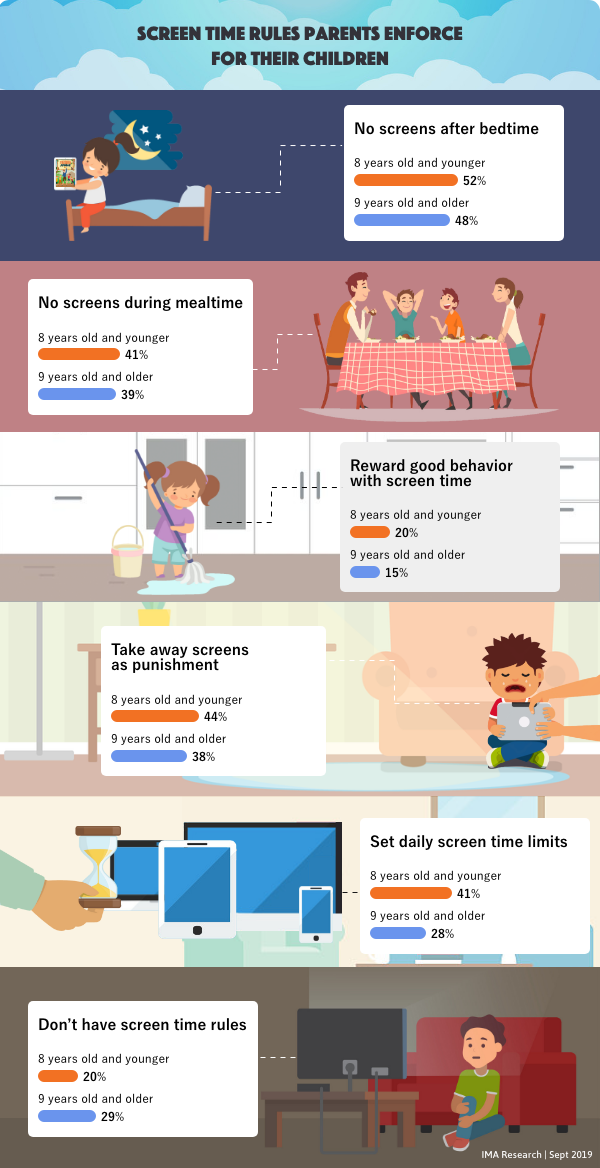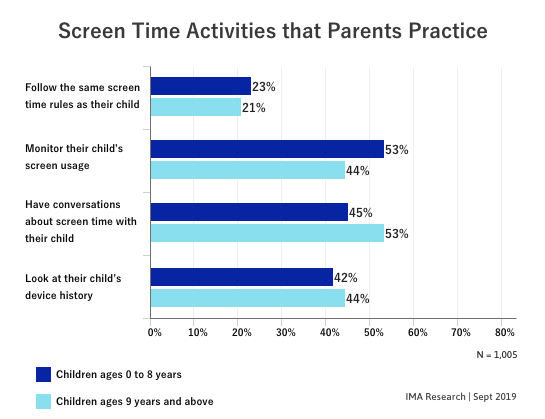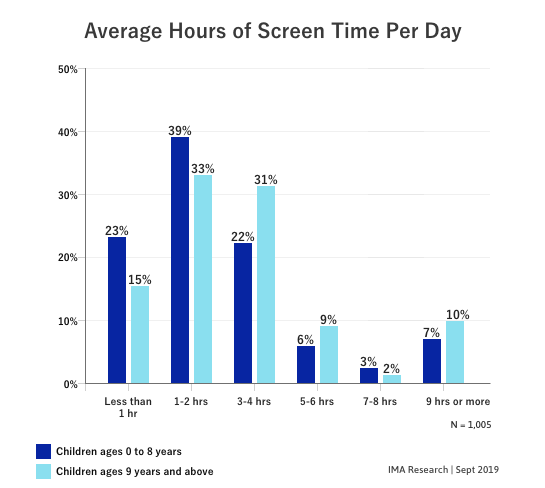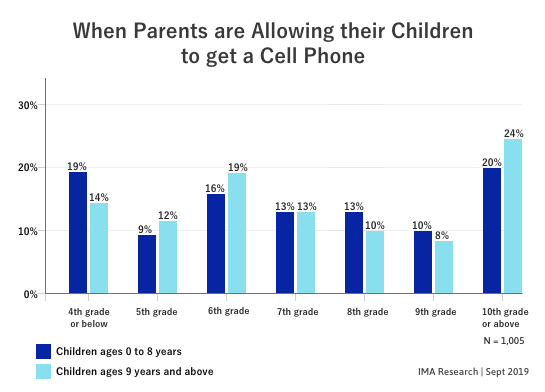U.S. children are surrounded by screens and media. Based on data from parents of children ages eight and younger, and parents of children ages nine and older, we estimate that children living in the U.S. will watch more than 4 trillion minutes of screen time this year.
The study below covers more than 10 choices parents need to make for their children, from bedtime rituals to what age is appropriate to have a cell phone. The data we collected closely matched considerations provided by experts on children and screen time. On average, the 75 million estimated children living in the U.S. will watch 2.5 hours of screens each day, equating to more than 4 trillion minutes. We also found:
- Screen time rules for children vary significantly across households. For example, just half of parents say they don’t allow screens after bedtime.
- Nearly all parents believe that their children have less or the same amount of screen time as other kids. Only 13 percent of parents believe that their children have more screen time than other children.
- Is this the end of the helicopter parent? Thirty-nine percent of parents aren’t aware of what their child is doing online.
- More than one-in-four parents will buy their child a cell phone before middle school, in 5th grade or earlier.
- One-in-three children ages eight and under have three or more hours of screen time per day. The same is true for half of children ages nine and older.
What screen time rules do parents have for their children?
Most of the leading experts on screen time agree on several different rules for children, including rules like no screens after bedtime and setting daily screen time limits. But are parents enforcing, or even aware of, those rules?

Parents and experts agree on bedtime, mealtime, but not daily limit rules
Most experts agree that children should not use screens after bedtime, and they also suggest removing devices from the bedroom altogether. Our study found that 52 percent of parents to younger children (ages eight and under) don’t allow their children to use screens after bedtime. For parents of older children (ages nine and above), 48 percent enforce the same rule.
The experts also agree screens shouldn’t be allowed during mealtime and parents should set daily screen time limits. Around 41 percent of parents to younger kids and 39 percent of parents to older kids don’t allow screens during mealtime. Forty-one percent of parents with younger children set daily screen time limits for their children, while only 28 percent of parents to older kids do.
Where experts disagree, parents do too
Many experts on screen time disagree about whether or not parents should reward good behavior with screen time or take away screens as a punishment for bad behavior. Twenty percent of parents to younger children reward good behavior with screen time and nearly half of them take away screens as a punishment. Only 15 percent of parents to older children reward good behavior with screen time while 38 percent take away screens as a punishment.
Overall, parents with younger children are more likely to have screen time rules than parents to older children. Twenty percent of parents with younger kids don’t have screen time rules at all, while the same is true of 29 percent of parents with older kids.
Do parents know what their children are doing online?
Children have access to more information online than ever before. While this allows them to easily learn more about the world, it also comes with many dangers. It’s important for parents to be aware of what their children are doing online to help them avoid stumbling across age-inappropriate information.

Thirty-nine percent of all parents don’t monitor their child’s screen usage or look at their child’s device history. It’s likely that many of those parents don’t know what their child is doing online at all. Around half of all parents have conversations with their children about screen time.
Experts agree that it’s important for parents to be aware of what their kids are doing online, and they should have regular conversations about screen usage.
Nearly one-in-four parents follow the same screen time rules that they set for their children. Experts debate whether or not parents need to follow the same exact rules as their children, but most experts do recommend that parents set a good example when it comes to screen time usage.
Just how strict are parents when it comes to media?

Across all children, the median time spent with screens was 2.5 hours per day. With an estimated 75 million children, U.S. kids will watch more than 4 trillion minutes of TV this year.
We asked parents how they think their child’s screen time stacks up against their peers. Just 13 percent of parents believe that their child has more screen time per day than other children. Around 45 percent of parents believe that their children have less screen time than their peers. The remaining 42 percent of parents believe that their children have the same amount of screen time as other children.
Screen time rules also vary between parents of different ages and genders. Our study found that female parents are more likely to monitor their child’s screen usage, with 56 percent of women doing so and only 47 percent of men. Women are also more likely to have screen time rules, as a higher percentage of men say that they don’t have any screen time rules at all. There are also small variations between the screen time rules of older and younger parents, with parents ages 34-years-old and younger being more likely to have screen time rules than those ages 35 and over.
When are children getting cell phones?

The addictive nature of smartphones makes it easy for children to spend countless hours staring at the screen. It seems like children are getting cell phones at younger and younger ages every year. However, according to parents, many of them are not. Twenty percent of parents to younger children say that they don’t plan to give their child a cell phone until they’re in the 10th grade or above. One-in-four parents of older children say the same.
There are still plenty of children getting cell phones at younger ages as well. Nineteen percent of parents to younger children plan to give their child a cell phone in fourth grade or below, while the same is true for 14 percent of parents with older children.
IMA Research is continuing to explore this topic with additional research. If you have questions, comments, suggestions or would like to connect with the authors, please reach out to us at research@inmyarea.com.


